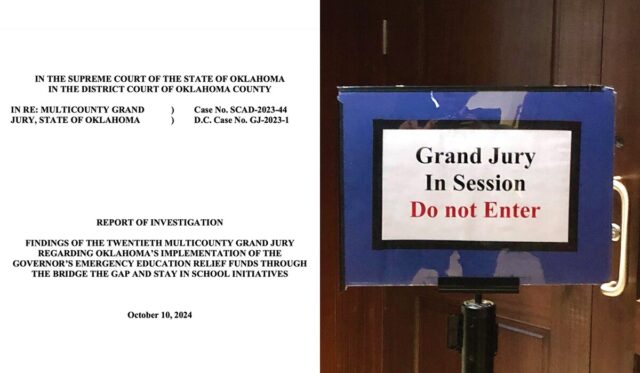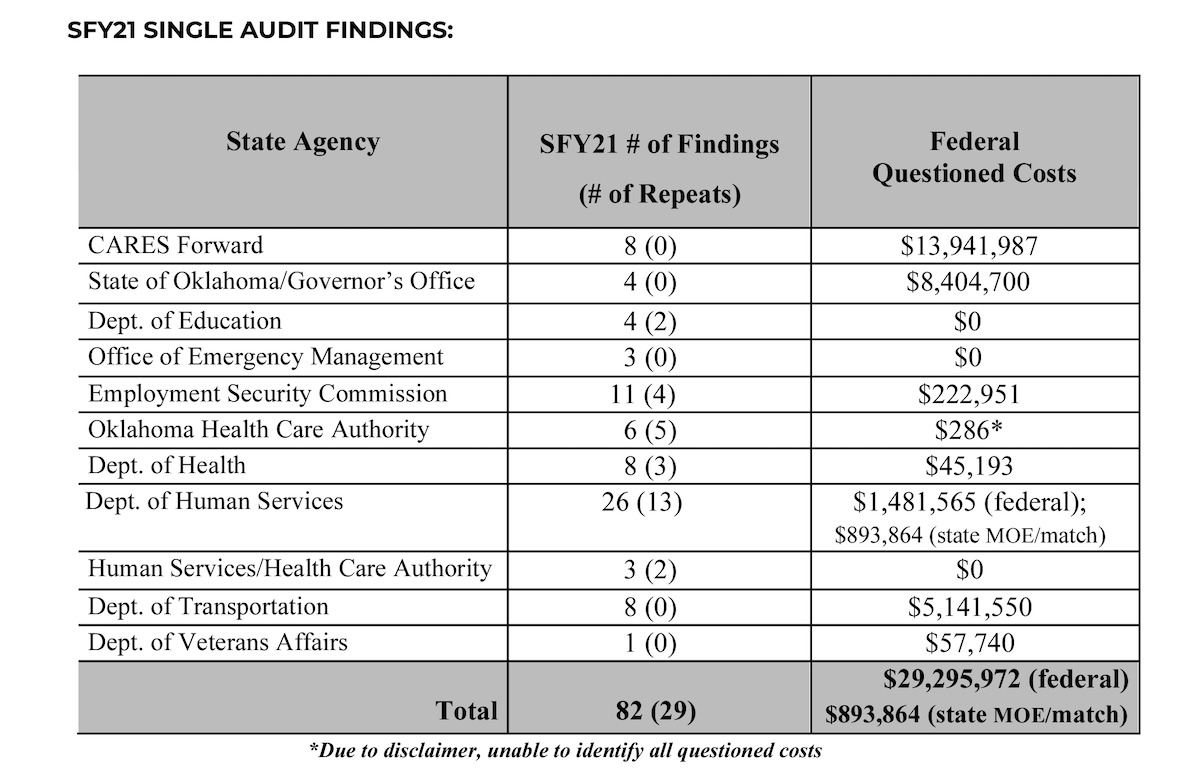

Oklahoma’s multi-county grand jury released a report today examining the extent to which Gov. Kevin Stitt, State Superintendent of Public Instruction Ryan Walters and other public officials’ handling of pandemic-era federal funding bordered upon criminal actions or negligence, but jurors ultimately found “insufficient evidence” of criminal activity.
Meeting three days a month for two months under the supervision of Oklahoma County District Judge Natalie Mai, jurors heard testimony and reviewed evidence presented by prosecutors in Attorney General Gentner Drummond’s office.
The examination involved state leaders’ handling of the Bridge the Gap and Stay in School programs, two aspects of how federal Governor’s Education Emergency Relief funds were used in Oklahoma. The state received $39.9 million in federal GEER funding. Of that money, Stitt allocated $8 million to BTG to allow families to purchase education materials while children were forced to learn at home. Stitt allocated another $10 million to the SIS program so low-income families with financial situations harmed by the pandemic could pay their private school tuition obligations.
“We ultimately find insufficient evidence exists to establish, beyond a reasonable doubt, that a crime was committed. Nor do we find willful or corrupt misconduct or willful malfeasance,” jurors wrote in their 31-page report, which is embedded below. “Nevertheless, we find the grossly negligent handling of federal grant money and utter lack of internal controls and oversight over the grant-funded initiatives to be irresponsible, disappointing, and indefensible. What’s more, the waste and misspending of millions of dollars in emergency aid was easily preventable.”
In their GEER funds report, the jurors largely confirmed previous reporting from The Frontier and Oklahoma Watch that showed families applying for grants in the BTG program were allowed to use the money for items such as Ring doorbells and smartwatches, rather than for educational materials.
“Unfortunately, as a result of the state’s irresponsible administration of the grant monies, both initiatives encountered substantial failures,” jurors said.
Stitt, Walters continue to blame ClassWallet
Questions have swirled over Stitt’s handling of GEER funds for years. Grand jurors looked in particular at the way Stitt chose to designate a school choice-focused nonprofit and a special interest organization to administer the BTG and SIS programs, rather than use the State Department of Education, which at the time had ample staff and experience with handling federal program compliance.
“This grand jury is deeply troubled by the manner in which the state offloaded its responsibility to oversee public funds onto private, non-state entities,” jurors wrote.
RELATED
‘Systemic issue’: Audit finds Oklahoma lacked oversight of pandemic relief funds by Tres Savage
For the BTG program, Stitt designated the school choice nonprofit Every Kid Counts Oklahoma — which was then led by Walters — to administer the program. EKCO chose to contract with the Florida-based digital services company ClassWallet to allow parents to apply for the grants. Stitt and Walters have repeatedly tried to blame that company for the botched program administration, and EKCO has since rebranded to Oklahoma Parents for Student Achievement.
According to jurors and previous media reports, Walters declined to exercise available limits on types of purchases within the ClassWallet system, instead allowing “blanket approval with vendors on [ClassWallet’s] platform.”
In an emailed statement Tuesday afternoon, OSDE director of communications Dan Isett again cast blame on ClassWallet.
“Superintendent Walters has prioritized carefully and efficiently using taxpayer funds. Unfortunately in this case, the vendor involved did not adhere to the same standards,” Isett said. “Superintendent Walters’ deep commitment to fiscal responsibility and taxpayer accountability has been borne out during his time as secretary and now as state superintendent. Under his leadership, OSDE has instituted the highest standards to ensure the most efficient use of taxpayer money possible.”
Stitt communications director Abegail Cave also reiterated claims of malfeasance against ClassWallet in an emailed statement.
“As said at the start of this report, no criminal activity or willful corruption occurred. The state trusted a vendor, that vendor failed to do its job,” Cave said. “The AG has weaponized a grand jury to sign off on a press statement his office prepared. Ultimately, this was an inappropriate and unlawful use of a grand jury, all to pursue a headline in the attorney general’s campaign for governor. Oklahomans can see right through this weaponization of the law.”
After reports came out alleging the mishandling of federal GEER funds, Drummond’s predecessor, former Attorney General John O’Connor, filed a lawsuit in August 2022 against ClassWallet. O’Connor’s office apparently declined to pursue the lawsuit, however, as no other filings besides the petition appeared on the case over the five months it was active, and no filings exist showing ClassWallet was even served with the lawsuit. In January 2023, Drummond dismissed the litigation shortly after taking office.
In January 2024, the Stitt administration again tried to sue ClassWallet, alleging breach of contract for the GEER fund programs. Less than two weeks after it was filed, Drummond took the case over from the private attorneys hired on behalf of the Office of Management and Enterprise Services, which had been the plaintiff in the case. Drummond dismissed it with prejudice and said the plaintiff’s claims were “wholly without merit.”
Jurors: AFC-Oklahoma director collected families’ personal information
Additionally, jurors revealed that the director of a school choice special interest group whom Stitt designated to administer the SIS program collected the personal information of families who received the funds. While she is not mentioned by name in the grand jury’s GEER funds report, Jennifer Carter is the “state lead” of the Oklahoma chapter of the American Federation for Children.
“The fact that the director of a special interest group obtained this personally identifiable information is itself concerning. More disturbing is the fact that the spreadsheet contained information that families did not provide in their applications, such as political party registration and voting district,” jurors wrote. “This indicates that, unbeknownst to families, their information was being collected and processed for purposes other than that for which it was disclosed.”
Jurors noted the lack of a contract between the state and any individual/organization chosen to administer the programs would make it difficult for anyone to be held accountable for the misspent funds.
“The evidence shows state officials, though perhaps well-intentioned, disregarded available administrative safeguards in favor of advancing a political and philosophical agenda,” jurors wrote.
Ultimately, jurors presented numerous recommendations to the state:
- Establishment of “minimum, mandatory and ongoing” training requirements in federal grant compliance for agencies receiving more than $10 million annually in federal grants;
- Promulgation of written rules or policies dealing with federal grant guidance for agencies receiving more than $10 million annually in federal grants;
- Establishment of a training program for elected officials, agency leaders and finance officers dealing with procurement and purchasing, conflict of interest avoidance and internal controls;
- Requirement that agencies or offices receiving federal grants have personnel who know how to handle federal money overseeing disbursement of the money;
- Legislation limiting the state’s ability to delegate authority over federal grants to private entities or individuals;
- Legislation requiring the vetting of private entities or individuals who might collaborate on the management of federal funding;
- Legislation requiring the state to have a contract with a private entity or individual with whom it collaborates on management of federal funding; and
- Requirement that the state use available public resources to handle federal funding, “regardless of political and philosophical differences between various segments of state government.”
State statute allows a grand jury to issue a report about matters investigated in front of the private panel of citizens. While a grand jury can issue criminal indictments, Oklahoma grand juries investigating allegations of state corruption have more commonly produced reports than criminal charges in recent years.
In 2018, a multi-county grand jury issued a report about mishandled funds at the State Department of Health. In 2021, a multi-county grand jury issued a report about Epic Youth Services and Epic Charter Schools. In 2022 and 2023, an Oklahoma County grand jury issued reports on three issues: Rep. Terry O’Donnell’s legislation that made it legal for his wife to become a state tag agent, Stitt’s efforts to influence the State Pardon and Parole Board, and systemic issues within the Oklahoma County Jail.
In response to the OSDH and Epic reports, the Legislature took no immediate action to implement jurors’ recommendations. Former Oklahoma County District Attorney David Prater ultimately charged Epic Youth Services’ co-owners with embezzlement and racketeering charges that are still pending. Prater’s grand jury indicted O’Donnell and his wife, but Drummond eventually dismissed those charges.
In the GEER funds report released Tuesday, jurors said “citizens deserve more from their government.”
“The waste and misspending of millions of dollars in emergency aid was easily preventable,” the jurors wrote. “This mismanagement prevented the most vulnerable Oklahomans from getting help they desperately needed during a global pandemic.”
Read the grand jury’s full GEER funds report





















